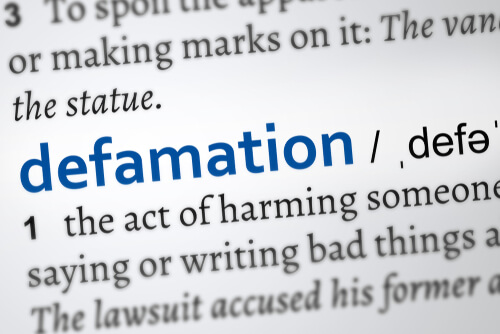商品のマーケティングや会社のブランディングなど、仕事でSNSの活用法について話し合う機会が増えています。SNSの持つ拡散力は良い意味での影響力として活用できれば強い味方ですが、個人や企業への攻撃を目的とした、誹謗中傷や嘘の書き込みといった負の側面は、大きな社会問題となっています。
今回は、SNSの誹謗中傷とその防止策について、アットイングイリッシュの英会話レッスン中の議論を追いながら、一緒に考え、英語にしてみましょう。
今回のテーマ:SNSの誹謗中傷と防止
過熱するネット上での誹謗中傷を、どう防ぎ、被害者をどう救済するのか、議論が進んでいます。テレビ番組に出演する女性プロレスラーの自殺した事件をきっかけに政府も法制度の整備に動き出しました。
これまでは投稿者を特定するだけでも、複数回の裁判が必要だったものを、一回で済むように簡素化したり、被害者の申し立てにより、裁判所が訴訟無しで開示の是非を判断する制度も検討されています。
その一方で、これを企業などが自社に批判的な書き込みをした人をけん制する道具として利用しないよう、表現の自由と被害救済のバランスも求められています。また、そもそもネット上での誹謗中傷が盛り上げるような、テレビ番組の制作はあるべきではない、盛り上がる誹謗中傷の書き込みはSNS 運営者側が早期に削除するべき、という見方も出ています。ネット上での誹謗中傷とその対策について考えてみましょう。
テーマについて、英語で考えてみよう

今回のテーマのディスカッションでは、主に以下の5つの点について、考えています。
1. Defamation(名誉棄損、誹謗中傷、悪口)とは?
2.他人を誹謗中傷するSNS上の投稿について、表現の自由と被害者の救済を考えたとき、投稿者の身元特定手続きを以前より取り易くすることについての意見は?
3.今回の新聞記事に取り上げられている元プロレスラーの女性の自殺の発端は、彼女がリアリティ番組へ出演したことでした。リアリティ番組の在り方自体に問題があるという意見や、SNSの使い方として「面と向かって言えないようなことは書かない方がいい」という意見がありますが、どう思いますか?
4. SNS上の誹謗中傷の取締りは、ソーシャルメディア側が責任を持つべきでしょうか?
5. もし、あなたが中学校の先生なら、SNSへの投稿の仕方について、生徒たちにどのようなアドバイスをしますか?
これからご紹介する意見(英語での回答例)を読む前に、これらの論点について、ご自身の中で考え、英語にしてみて下さい。皆さんなら何を、どんな風に表現しますか?
英語での回答例
内容を英語で要約する
Q.記事の内容をまとめてみましょう。
1. The article addresses the problem that seems to be increasing, of defamation via the Internet and social media. It looks at how to rectify this problem since it is having such a big and negative social impact on all manner of things.
この記事では、増加していると思われるネット上やソーシャルメディアでの誹謗中傷の問題を扱っていて、この問題はあらゆるものに社会的に大きくネガティブな影響を及ぼすので、どのように是正すべきかに注目しています。
2. The article looks into a number of complex issues, for instance regarding the ramifications of possible immediate disclosure of the identity of abusers, in the case of a lawsuit.
この記事は幾つもの複雑な問題について考察しています。例えば、訴訟において、誹謗中傷した人の身元が即座に開示されることが起こり得ることの影響などについてです。
※ramifications は、事態をさらに複雑にする可能性のある、予期しない結果[問題・影響]という意味です。
3. This article discusses the growing problem of online defamation of individuals, mainly through social media, the challenges presented in identifying those responsible, and the government’s efforts to make identification more transparent, to streamline the process for victims seeking legal redress.
この記事では、大きくなってきている問題である、主にソーシャルメディアにおけるオンライン上での個人の誹謗中傷、そして、その責任を負うべき人を特定する際の課題、及び、被害者が法的救済を得るためのプロセスを簡素化するための、特定手続きを透明化する政府の取組みについて論じています。
4. The article describes the case of a young Japanese lady who committed suicide after being the target of harsh online defamation.
この記事では、激しいオンライン上での誹謗中傷の標的となった後に自殺した日本人女性の事例を説明しています。
テーマのキーワードとなる言葉を定義する
Q. Defamation(名誉棄損、誹謗中傷、悪口)とは、どういう言葉でしょうか?
1. Defamation is the act of disseminating false information, either orally or in writing, for the purpose of disparaging a person’s character.
Defamationとは、人の人格を貶める目的で、口頭または書面で虚偽の情報を広める行為です。
2. Defamation is a legal term, referring to lawsuits filed, most often by companies seeking to protect their corporate reputation, or famous persons victimized by inaccurate, sensationalized reporting.
Defamationは法律用語で、大抵の場合、評判を守ろうとする企業やいい加減でセンセーショナルな記事の被害にあった有名人により提起された訴訟を指します。
3. Defamation has to do with a measure that takes place in the public sphere to reduce the moral standing of a person treated in this way, which occurs in contradiction to their actual manner of thinking or conducting themselves.
Defamation は、公の場で、ある人の倫理的名声を貶めるために行われる行為に関するもので、その人の実際の考えや行為とは相容れないものになっています。
(いいね!:a measure that takes place in the public sphere)
(いいね!:to reduce the moral standing of an person)
(いいね!:in contradiction to …)
4. Those who are “defamed” will lose out in future economic stakes and possibly suffer worse social and political repercussions.
誹謗中傷されると、経済的な利害において負けることになったり、悪化する社会的、政治的な余波に苦しむことになりえます。
2つの相反する側面から問題を噛んげる
Q.他人を誹謗中傷するSNS上の投稿について、表現の自由と被害者の救済を考えたとき、投稿者の身元特定手続きを以前より取り易くすることをどう思いますか?
1. I wholeheartedly support any measure that makes it easier to identify those who engage in spreading defamatory messages. This is a very cowardly act.
誹謗中傷のメッセージを拡散することに一生懸命になっているような人たちを特定し易くするための、あらゆる措置を心から支持します。これはとても卑劣な行為です。
2. Online bullying and intimidation is a very serious problem in society today, as is the practice of companies hiring individuals and organizations to post defamatory reviews of their competitors’ products and services.
競合他社の製品やサービスを誹謗中傷するレビューを投稿するために個人や組織を雇う企業の慣行と同様に、オンラインでのいじめや脅迫は今日の社会では非常に深刻な問題です。
3. Personally, I don’t think individuals should be targeted or made an example of, but on the other hand, we should start to see that social media is an extension of real-life social experience.
個人が標的とされたり、見せしめにされたりするべきではないと個人的には思いますが、一方で、ソーシャルメディアを実際の生活の社会活動の延長と見做し始めるべきです。
4. If some people are receiving very negative responses, this is not dissimilar from real life. The failure so far has been in not taking this dimension of life seriously enough.
もし、とても嫌な対応を受けている人たちがいるのであれば、これは現実生活と異なるものではありません。これまでの失敗は、生活のこういった側面を十分に真剣には取り上げては来なかったことにあります。
問題のそもそもの発端
Q. そもそも、リアリティ番組の在り方に問題があるという意見、SNSの使い方として、「面と向かって言えないようなことは書かない方がいい」という意見がありますが、どう思いますか?
1. I think that so-called “Reality TV’ is the most horrible invention. People really need to understand the risks of getting involved.
いわゆる「リアリティ番組」というのは、最も不愉快な発明だと思っています。関わることのリスクをきちんと理解するべきです。
2. I believe this kind of sensationalized television programming panders to the basest instincts of society, the desire to watch while others are debased, degraded, and humiliated.
この種のセンセーショナルなテレビ番組は、他の人がおとしめられ、対面を傷つけられ、恥をかくのを見たいという、社会の最も卑しい本能に付け込んでいるものだと思います。
3. It is often disguised as “providing a forum for people to tell their story.” And the producers often hide behind the statement that “our show provides support and assistance for our guests, so we do a lot of good.”
こういうのは、よく「自分の物語を話す場所を提供する」というように偽装されています。また制作者側は、自分たちのショーは支援や応援を提供するもので、大変世の中の役に立っているものだ、という言葉の陰に隠れたりします。
4. In general, it makes sense that people should treat social media the same way that they would treat face-to-face communication. But in practice, this is difficult to reinforce. What I support is the idea of people becoming increasingly aware of consequences, as well as how their remarks affect others.
一般的には、ソーシャルメディアを対面のコミュニケーションと同様に扱うべきというのは、理に適っています。しかし、実際のところ、そう促すことは難しいです。私が良いと思うのは、人々が自分の発言がどう他の人に作用するかも含めて、もっと影響を自覚することです。
5. I absolutely support this statement. Hiding behind anonymity for the purpose of harshly criticizing another person is a very cowardly act.
私は、もちろんこの意見を支持します。他人を厳しく批判する目的で匿名性の影に隠れているなんて、とても卑怯な行為です。
責任の所在は?
Q. SNS上の誹謗中傷の取締りは、ソーシャルメディア側が責任を持つべきという意見があります。どう思いますか?
1. I think that it may be difficult to determine what comprises a “malicious post” in some cases.
場合によっては、何を「悪意ある投稿」とするかを特定するのは難しいかもしれないと思います。
2. In general the issue needs to be addressed on two sides, which is that the original poster needs to become more aware of the risks, and the moderators also need to be trained so that they can spot something that may be unfairly targeting an individual.
一般的に、この問題は2つの側面で対処する必要性があります。そもそも投稿する人がリスクについてもっと認識しなくてはいけないということ、そして、管理者側も個人を不当に標的にしているようなものを見つけられるよう訓練が必要ということです。
3. When companies like Facebook hide behind statements such as “protection of freedom of expression,” they display a cold, callous disregard for the rights of their own users. Freedom of expression does not include the right to spread false information about others.
Facebookのような企業が「表現の自由の保護」といった言葉の陰に隠れるときには、冷たく、無慈悲に自分たちのユーザーの権利を無視しています。表現の自由には、他人に関する虚偽情報を広めてよいという権利など入っていません。
自分に置き換えて考える
Q. もし、あなたが中学校の先生なら、SNSへの投稿の仕方について、生徒たちにどのようなアドバイスをしますか?
※もしあなたが中学校の先生なら、生徒たちに何を言いますか?ご自身の子供たちと、SNSの使い方について、話し合ったことはありますか?
1. I would instruct students to never post a statement in anger, because, once the message has been sent, it might be seen by literally millions of witnesses.
私なら、生徒たちに怒って投稿するようなことは決してしないように指導します。なぜなら、一度、送ってしまうと、文字通り何百万人もの目撃者を作ることになりかねないからです。
2. I would advise them to choose their words carefully before posting anything, and to remind themselves that whatever they post is a reflection of their character, and their messages might be seen by their parents, families, friends, and others.
投稿する前には慎重に言葉を選び、何を投稿しようと、そこに性格が顕れること、そして、そのメッセージは親や家族、友人などに見られる可能性があると、釘を刺します。
英語会議や英語プレゼンなど、ビジネスの場への応用
 英語回答例の中で、特にビジネスの場で多用できる表現は、太字にしてご紹介しています。
英語回答例の中で、特にビジネスの場で多用できる表現は、太字にしてご紹介しています。
中でも、
I wholeheartedly support any measure that ___.
I absolutely support this statement.
What I support is the idea of __
は、会議で、他の人の意見への同意を表現するときに活用できます。
But on the other hand,
は、逆の見方を紹介する時によく使われます。
The issue needs to be addressed on two sides,
は、課題について、二つの側面(あるいは、two を several に変えて複数の側面)から考えるべき時に使います。多面的に話し合いたい時に、こういった表現ができるとカッコいいですね。
Personally,
In general, it makes sense that
In practice,
は、会議やプレゼンなどで、これから「個人の見方」について話すのか、「一般的な見解」なのか、「実際ベース」の話しなのかを、最初のひと言で示すサインとなり、聞き手にとって分かり易いスピーチにしてくれます。
是非、試してみて下さい。










